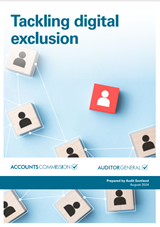Tackling digital exclusion

Digital exclusion can have a severe impact on people’s lives, particularly with a trend since Covid-19 of increased use of digital technology to deliver services. This report from Audit Scotland looks at how well the public sector in Scotland are tackling digital exclusion and what more they can do.
The report defines digital exclusion, assesses how well the public sector in Scotland is tackling the problem and outlines the route to enabling digital inclusion. The work is informed by those with experience of digital exclusion and use of digital services in Scotland, and finds not enough is being done to tackle the harms caused by digital exclusion, making a series of recommendations to public bodies on how to do more to support people to use digital tools in a way that benefits them and makes sure they can access the services they need.
Audit Scotland find that failing to do so intensifies the impacts felt by already vulnerable people – due to poverty, age or because they have a disability – with examples including difficulties with access to housing services, including those related to housing adaptations. They have also produced a supplement with questions that public bodies can ask themselves to scrutinise their progress to develop inclusive digital services.
If you found this of interest, the Housing LIN's work on Technology for our Ageing Population: Panel for Innovation (TAPPI) included work with Bield Housing and Care in Scotland as a testbed for assessing digital services and solutions supporting personalisation and delivery of better outcomes for people. You can read more about the Bield testbed here.
